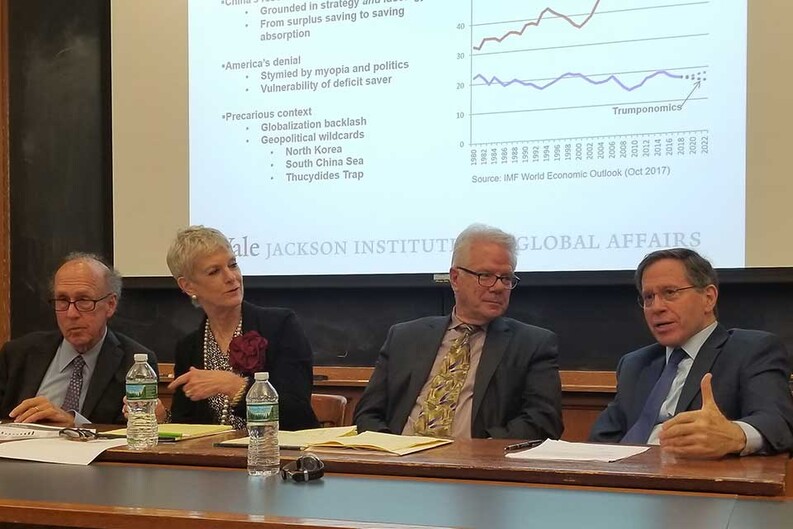Paul Tsai China Center Hosts Panel on China’s 19th Party Congress

On Thursday, November 2, the Paul Tsai China Center convened a panel discussion at Yale Law School on the just-concluded 19th National Congress of China’s Communist Party. The program featured four leading scholars: Paul Gewirtz, Potter Stewart Professor of Constitutional Law and Director of the Paul Tsai China Center at Yale Law School; Jamie Horsley, Senior Fellow of the Paul Tsai China Center and Visiting Fellow at the Brookings Institution John L. Thornton China Center; David M. Lampton, Professor and Director of China Studies at the Johns Hopkins School of Advanced International Studies (SAIS) and Chairman of the Asia Foundation; and Stephen S. Roach, Senior Fellow at Yale University’s Jackson Institute for Global Affairs and former Chairman of Morgan Stanley Asia.
The panelists discussed how the 19th Party Congress strengthened President Xi Jinping’s authority as China’s “core” leader, enshrined “Xi Jinping Thought” in the Party Constitution, and set forth a broad blueprint for achieving the “Chinese Dream” for the country’s 1.4 billion people in the “New Era.” They analyzed the Congress’s implications with respect to China’s economy, legal reform, and U.S.-China relations.
Professor Roach considered the 19th Party Congress from an economic perspective and analyzed the current challenges in U.S.-China economic relations. He emphasized his view that China needs to resolve several domestic economic “contradictions” and shift to a more consumer-led economic model in order to achieve economic rebalancing.
Professor Horsley highlighted the emphasis on law-based governance in Xi’s political report to the Congress. It affirmed the supremacy of the State Constitution and law, but its core message was that Party leadership is the defining feature of socialism and “rule of law with Chinese characteristics.” She noted recent developments that blur the line between Party and State, including the planned establishment of a merged Party-State national supervision commission, to expand Xi’s signature anti-corruption campaign to all personnel exercising public power, and recent examples of writing Party functions into State law.
Professor Lampton focused his remarks on U.S.-China relations in the Xi Jinping era. He analyzed President Xi’s speech at the Party Congress from a foreign policy perspective and said that it strongly indicated that China intended to play a more assertive role on the world stage. In addition, Professor Lampton shared his predictions regarding President Trump’s upcoming trip to Asia.
Professor Gewirtz highlighted the reemergence of China as one of the most important geopolitical events of the 21st century. He explored key elements in President Xi’s speech and shared his thoughts on Xi’s notion of “the great rejuvenation of the Chinese nation.” In his concluding remarks, Professor Gewirtz encouraged the audience, especially the law students, to pay attention to China’s increasing regional and global influence and to strive to study and understand the implications of China’s rise for the United States and the world.
Written by Sean Song ’18


